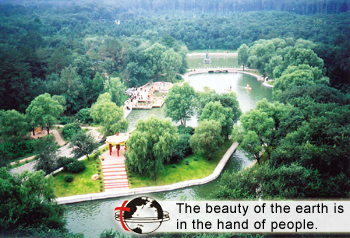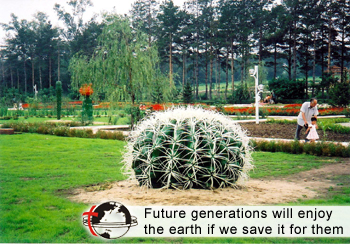
China Bridge (神州橋樑)_2006/Jul
Protecting the environment for future generations
There are no statistics in this article. Readers who love numbers can find an overwhelming array of figures in print and on the Internet about China’s environment, land, water, air, energy and health. Residents of Hong Kong have not needed a calculator to notice smog replacing blue skies. Visitors to many parts of the world, including China, see urban sprawl and litter, plus new roads and buildings where recently there were forested hillsides and farms. Since China has industrialised so rapidly and is now the world’s factory, pollution is especially worrisome. Beijing and other places in northern China reported record high temperatures for June, adding to fears of global warming.
White Paper on environmental protection
The central government is worried. The Information Office of the State Council published a lengthy white paper, Environmental Protection in China (1996-2005), on 5 June 2006, World Environment Day. The problem will not go away by itself, as the following quote says, “A relative shortage of resources, a fragile ecological environment and insufficient environmental capacity are becoming critical problems hindering China’s development.”
All such white papers follow this format: There is a problem. The state has passed numerous laws and regulations to deal with it. Officials at all levels from top to bottom in the relevant departments are taking vigorous action. China has constantly strengthened and improved the administration of the laws. Wrongdoers are being caught and punished. No one can afford complacency, but there is no reason to panic. In conclusion, the state will strive vigorously, to educate the people and improve the situation. How else would officials in Beijing, or in any other capital, compose a report to the public and to the whole world, on a burning social issue?
Environment Protection has several noteworthy points. It mentions global climate change and China’s ability to contribute to the protection of planet earth. References to foreign interference in China’s internal affairs are pleasantly absent. Non-government organisations are never mentioned. Initiative flows from the top down, from the state, rather than from any groups of citizens at the rice-roots level. That much has not changed. But the priority for development now is not simply economic growth but instead a balance of ecological, environmental and social goals. This is a welcome broadening of the definition of progress.
Not only “the Chinese people of today but also their children and grandchildren” will benefit from a cleaner environment. Yes, greed and the desire for quick profits have damaged the natural world and long-term solutions are needed. The emphasis is on the scientific approach to solutions. Perhaps this reflects uneasiness with emotional environment activism, as seen in the West.
Confucians and Daoists see more than the price tag


Pollution costs money and cleaning up the environment will more than pay for itself in lower medical bills and increased farm output. But are gray, ugly surroundings only an economic problem, whose cost can be estimated, or do spiritual values also come into play?
Chinese periodicals have recently praised Confucius for promoting harmony among people and also with nature. This is a new compliment to the sage. It was the mystic Laozi and later Daoists who always spoke of being one with the natural world.
A later Confucian scholar, Zhang Zai (張載 1020-1077) managed to combine a Daoist mystical vision of oneness with the universe and a Confucian sense of responsibility in the social and political arenas. Zhang posted his famous essay on the west wall of his house. The Western Inscription begins, “Heaven is my father and earth is my mother and even an insignificant creature as myself finds an intimate place in their midst.” Then Zhang writes about fitting into one’s place in the political hierarchy, serving the emperor and dying in peace. Maybe the Western Inscription is too metaphysical for a scientific age, or maybe science cannot capture the beauty and wonder of our world.
Is Christianity the cause of the problem?
But how does any of this concern Christians? Many ecologists blame Christians for the problem, since Genesis 1:28 tells people to “Be fruitful, multiply, fill the earth and conquer it. Be masters of the fish of the sea, the birds of heaven and all living animals on the earth.” Their criticism is off target.
First of all, Christians have had no monopoly on overtaxing the earth. People from Central America during the Classical Mayan period to Easter Island managed to harm their environment without any input from Christianity. In 300 BCE, Mencius (孟子) pointed to a once-forested hill that had become bare and brown from the woodcutter’s axe as an analogy for someone born with an originally good nature who had become bad through poor upbringing and lack of schooling. Throughout the 20th century, Dingxi and Longxi in Shaanxi (陝西定西,龍西) were the poorest districts in China. Yet 1,300 years earlier they had been China’s best pastures for huge numbers of horses. The good news is that recent tree planting and terracing have undone some of the damage from prolonged over-grazing and soil erosion.
The Industrial Revolution started in Protestant countries, but when communists came to power further to the east they were firm believers in heavy industry. Neither Christians nor Marxists call communism the spiritual successor of Christianity. During the Cultural Revolution, the first doctors to diagnose patients with lung problems due to air pollution were told they were mistaken, since pollution is a vice of capitalism, whereas China had socialism. Today we all agree: it doesn’t matter if a smokestack is capitalist or socialist, Christian or atheist, it cannot be a good smokestack without air pollution control equipment that is periodically maintained and honestly monitored. Even then some people have their doubts.
Hebrew Love for the Land
There is a long Jewish tradition of caring for the earth. In Leviticus the Lord says, “Land must not be sold in perpetuity, for the land belongs to me, and you are only strangers and guests” (Lev. 25:23). That same chapter tells the Israelites to leave the land fallow every seventh year, and God would provide through earlier, abundant harvests. The jubilee (50th) year mandates the freeing of slaves and the return of fields that had to be sold in times of hardship. Social justice is the theme of the jubilee, but it was also meant to be a year to let the land lie fallow (untouched). Crop rotation and leaving part of the farm untended once every several years were traditional ways to restore fertility to the land and to prevent soil erosion.
Sadly, there is little historical evidence that Leviticus 25 was ever put into practice in ancient Israel. To paraphrase what Chesterton said about Christianity, the reason may have been “not that it was tried and found wanting but that it was found difficult and never tried.” In the 21st Century, it may be difficult for us to save the environment, but we have to try.
The Lord’s promises to Israel would be fulfilled not only when “they will hammer their swords into plowshares” (Micah 4:3), but also when “each man will sit under his vine and his fig tree, with no one to trouble him” (Micah 4:4). It is hard to picture trees clapping their hands (Is. 55:13), but harmony among people cannot be complete without the natural world also achieving its potential.
Christians care for this world as well as the next
In the New Testament, the emphasis seems overwhelmingly to be on the next life, not on this life, but rather on the new heaven and earth. Admittedly, a few Christians have fallen into this pitfall. In a discussion 20 years ago on the quota of trees to harvest from forests in the United States of America, a high official in the Department of the Interior allegedly told representatives from the timber industry, “Go ahead, cut all the trees down, Jesus is returning in a few years anyway.” Such an attitude is not Christian stewardship. Luckily, someone leaked that quote to the media and the official promptly denied ever saying it.
By contrast, Vatican II stated: “Far from diminishing our concern to develop this earth, the expectancy of a new earth should spur us on, for it is here that the body of a new human family grows, foreshadowing in some way the age which is to come” (Gaudium et Spes, n. 39). In 1965, only a handful of people were aware of a pending environmental crisis. Increased concern with the health of our planet has led Catholics to take a second look at our tradition of caring for our earthly home.
St. Benedict’s motto was, “Pray and work,” and monks were to value not only their prayer books and altar vessels, but also their land and work tools. They practised sustainable agriculture. Everyone has heard of the love of St. Francis Assisi for animals and for all of nature. Many people call him “the patron saint of the environmental movement,” but fewer are willing to copy his simple lifestyle.
The Catholic Church definitely sees people as the summit of creation. Baby humans rate higher than baby seals. The challenge is to provide room for both people and other species, now and in the long-term. As Gandhi said, “The world can provide enough for everyone’s need, but not enough for anyone’s greed.” One hopeful sign is that many people are now asking themselves, “How much is enough?” Christians in China can set a good example by living free from greed and by caring for God’s creation.


 ENG
ENG